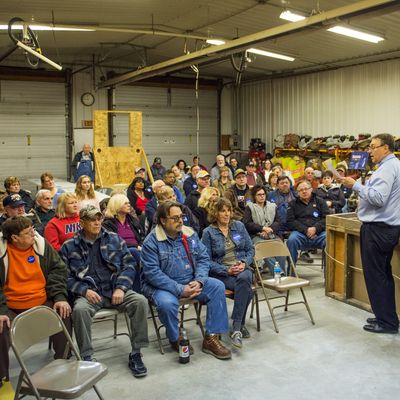
In a potentially major development affecting two of the four protected “early states” in the 2020 Democratic presidential nominating process, the Democratic National Committee let it be known that it’s going to disallow the “virtual caucus” option for remote access to delegate selection events in Iowa and Nevada next February. The Des Moines Register broke the story:
The decision was confirmed to the Des Moines Register late Thursday by two sources close to the conversations. It follows a meeting of the DNC’s Rules and Bylaws Committee last week in San Francisco, where members voiced concerns about the security of the Iowa plan and the potential for hacking.
First Iowa, and then Nevada, have developed plans to let otherwise eligible voters cast their votes in caucuses by phone rather than showing up in person. What will make the apparent red light maddening to party officials in the two states is that the DNC forced them to make this option available in response to complaints — many of them from 2016 Bernie Sanders supporters, though Hillary Clinton offered similar criticism back in 2008 — that the traditional caucuses (and more generally, the traditional nominating process) excessively restricted participation. Iowa (followed by Nevada) wound up choosing a teleconference model for remote caucusing as more feasible than an absentee-ballot system or caucusing-by-proxy. But then this happened, as Bloomberg reported last weekend:
At a closed-door session of the Rules and By-Laws Committee on Thursday, the DNC told the panel that experts convened by the party were able to hack into a conference call among the committee, the Iowa Democratic Party and Nevada Democratic Party, raising concerns about teleconferencing for virtual caucuses, according to three people who were at the meeting.
The trouble — for Iowa, at least — with something less techno-dependent like mail ballots is that it could make the caucuses begin to resemble a primary and run afoul of New Hampshire’s law requiring its secretary of state to do whatever is necessary, including moving its primary to the previous year, to maintain its first-in-the-nation status.
It probably didn’t help the reputation of the “virtual caucus” system that it was even more fiendishly complicated than the traditional Iowa event, as Vox explains:
The plan the Iowa Democratic party came up with would have given virtual caucus-goers six different days/times to call and choose their candidates. The last available day would have been February 3 — caucus day itself. Users would have dialed a phone number, entered a unique pin and their date of birth to verify their identities, and ranked up to five 2020 candidate choices over the phone.
What was trickier is how these people’s votes were to be counted and how much they would have accounted for. Here’s how it was supposed to work: All of Iowa’s four congressional districts would have been allocated up to an additional 10 percent of the overall state delegate equivalents (or, the delegate totals from each county). In other words, if one congressional district had 400 people going to their delegate convention, they would get an extra 40 delegates that could be awarded based on the results from the virtual caucus.
This wrinkle exacerbated complaints about Iowa’s “delegate equivalent” system for reporting caucus results; the DNC had already required that raw caucus totals be made public (to this day, many Bernie Sanders supporters believe he, not Clinton, would have won Iowa in 2016 had raw votes been reported). Two pots of raw votes — one of live caucusgoers, one of virtual caucusgoers — made the whole thing even more unwieldy.
Nevada had a simpler system whereby people could call in votes during one two-day window, but it has to go back to the drawing board as well.
With the Iowa and Nevada caucuses less than six months away, the DNC may simply decide to give Iowa and Nevada a waiver from its rules for 2020 and then work on fixing the system for the future — or perhaps even make more fundamental reforms in the nominating system. If that happens, a lot of campaign planning based on the virtual caucuses will have been wasted. Iowa political analyst Pat Rynard speculates about the potential impact:
Politically speaking, the biggest beneficiary of this debacle is Joe Biden. One of the best strategies to winning the Iowa Caucus is to inspire, organize and bring out a lot of new, first-time caucus-goers. Candidates like Elizabeth Warren, Bernie Sanders, Kamala Harris, Pete Buttigieg, Cory Booker and Julian Castro are all very well-suited to do just that. While Biden has strong support among the older and long-time caucus veterans who always show up, it is harder to see how he would turn out a whole new generation of caucus-goers like Barack Obama did in 2008 or Sanders did in 2016.
The virtual caucus would have greatly aided candidates who were focused on new voters. Even though they were still emphasizing showing up in person, campaigns would happily direct their supporters who simply can’t make it out on caucus night into the phone option.
However, even if this caucus runs like a more traditional year, Warren’s superior ground game still poses the greatest threat to Biden. But Biden’s chances are certainly better without the virtual option, and any margin of victory from anyone who might pass him may be smaller.
It’s possible as well that having provoked the reforms that led to the virtual caucus system, Sanders supporters will view the DNC action as another Establishment effort to “rig” the results. But this really isn’t a very good time in political history to adopt potentially hackable technologies for voting events. So Iowa and Nevada may just be between a rock and a hard place for now — with all those candidates adjusting on the fly.






























